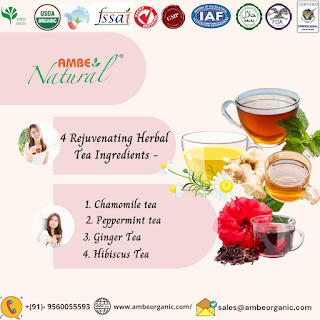4 Rejuvenating Herbal Tea Ingredients
Herbal tea has been around for centuries. Yet, despite their
name, herbal teas are not true teas at all. True tea, including green tea,
black tea and oolong tea, is made from the leaves of the Camellia sinensis
plant. On the other hand, herbal teas are made from dried fruits, flowers,
spices or herbs. This means herbal teas can come in a wide range of flavors and
tastes and make for an attractive alternative to sweetened drinks or water. In
addition to being delicious, some herbal teas have health-promoting properties.
In fact, herbal teas have been used for hundreds of years as a natural remedy
for a variety of ailments. Interestingly, modern science has begun to find
evidence supporting some of the traditional uses of herbal tea, as well as some
newer uses.
Here is a list of 10 healthy herbal teas that you might want
to try.
Chamomile tea is used for sleep aid and which is commonly
known for calming effects. Chamomile tea or extract is best effective on sleep
problems in humans. In a study of 80 postpartum women experiencing sleep
problems, drinking chamomile tea for two weeks improved sleep quality and reduced
symptoms of depression. Another study in 34 patients with insomnia found that
after taking chamomile extract twice a day there was a slight improvement in
nighttime wakefulness, sleep time, and daytime functioning. What's more,
chamomile just may not be useful as a sleep aid. It is also believed to have
anti-inflammatory, antibacterial and liver-protecting effects. Studies in rats
and mice have found preliminary evidence that chamomile may help fight diarrhea
and stomach ulcers. One study also found that chamomile tea reduced symptoms of
premenstrual syndrome, while another study showed improvements in blood sugar,
insulin, and blood lipid levels in people with type 2 diabetes. While more
research is needed to confirm these effects, preliminary evidence suggests that
chamomile tea may offer a variety of health benefits.
Peppermint tea is BEST one of the most widely used herbal
teas in the world. While it is most popularly used to support digestive system
health, it also has antioxidant, anticancer, antibacterial and antiviral
properties. Most of these effects have not been studied in humans, so it is not
possible to know whether they may have health benefits. However, few people
known about that peppermint tea is best for digestion system Several studies have shown that peppermint
oil preparations, which often include other herbs, can help relieve indigestion,
nausea, and abdominal pain. Evidence also suggests that peppermint oil is
effective in reducing spasms in the intestines, esophagus, and colon. Which is
best effective in relieving symptoms of irritable bowel syndrome. Therefore,
mint tea is a great natural remedy when you experience digestive discomfort, be
it from cramps, nausea or indigestion.
3.
Ginger Tea
Ginger tea is a spicy and delicious beverage that is packed
with healthy, disease-fighting antioxidants. It also helps fight inflammation
and stimulates the immune system, but it is known to be an effective remedy for
nausea. Studies consistently show that ginger is effective in relieving nausea,
especially in early pregnancy, although it may also relieve nausea caused by
cancer treatments and motion sickness. Which ginger may help prevent stomach
ulcers and relieve constipation or indigestion? Ginger can also help relieve
menstrual pain and dysmenorrhea. Several studies have found that ginger
capsules reduce pain associated with menstruation. In fact, two studies found
ginger to be as effective as non-steroidal anti-inflammatory drugs (NSAIDs)
such as ibuprofen in relieving menstrual pain. Ginger may provide health
benefits such as diabetes and ginger supplement which help to blood sugar
control and lipid levels.
4.
Hibiscus Tea
Hibiscus tea is made from the hibiscus plant. It has a
pinkish-reddish color and a fresh, pungent taste. It can be enjoyed many form
such as iced or hot. In addition to its bold color and unique taste, hibiscus
tea offers health benefits. For example, hibiscus tea has antiviral properties,
and test-tube studies have shown its extract to be highly effective against
strains of bird flu. However, there is no evidence showing that drinking hibiscus
tea can help you fight off viruses such as the flu. Several studies have
examined the effects of hibiscus tea on high blood lipid levels. Some studies
have found it to be effective, although a large review study found that it did
not have a significant effect on blood lipid levels. Nevertheless, hibiscus tea
has been shown to have best a positive effect on high blood pressure. In fact,
several studies have found that hibiscus tea reduces high blood pressure,
although most studies were not of high quality. In addition, another study
found that taking hibiscus tea extract for six weeks significantly reduced
oxidative stress in male football players. If you are taking
hydrochlorothiazide, a diuretic medication, be sure to avoid drinking hibiscus
tea, as the two can interact with each other. Hibiscus tea can also reduce the
effects of aspirin, so it's best to keep them 3-4 hours apart.
Ambe Ns Agro Products Pvt Ltd has been certified ISO 9001:2008 for manufacturing, testing, and supply of organic products and botanical extracts for pharmaceutical, healthcare & nutraceutical industries. We offer a complete range of high-quality Herbal extracts, Dry extracts, Phytochemicals, Nutraceutical products, Organic powder, and Essential oils, Fragrances, and Flavors at wholesale. And for more information visit: - http://www.ambeorganic.com/ Mail on- sales@ambeorganic.com



.png)
Comments
Post a Comment